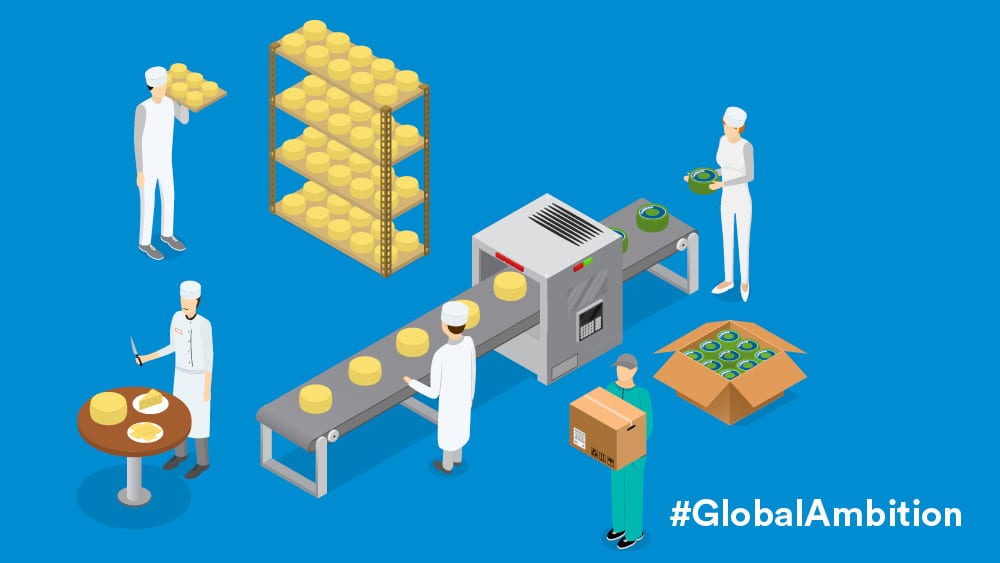Orla Battersby, divisional manager for food at Enterprise Ireland, outlines the factors driving the rapid growth of the country’s largest indigenous sector.
The value of Irish food, drink and horticulture exports increased by 13% in 2017, to reach €12.6 billion, a new record. This stellar performance marked the eighth successive year of growth for Ireland’s largest indigenous sector.
While many factors have played a role in the achievement, chief among them is the ingenuity and innovative capacity of Irish food companies. Successful exporters in this most competitive of sectors must by their nature be innovative. They must be capable of extremely rapid responses to changes in consumer demand, while at the same time remaining capable of meeting the exacting requirements of grocery multiples in relation to price, quality, and new product development.
At its simplest, innovation in food and beverage products is the market-led development of new or improved products to meet changing customer needs. But innovation is actually much more multifaceted than that. It is about embracing a culture throughout the whole business. Innovation means taking a customer-centric approach to all aspects of the company, from who is hired through to technology and processes utilised, the packaging of products and the way they are branded and sold.
Enterprise Ireland supports food and beverage innovation in numerous ways and has assisted approximately 100 significant in-company research, development and innovation projects for clients across the sector since 2013. These projects range from new, more efficient and lower-cost manufacturing processes to product reformulation and new product development, with the aim of breaking into new customer segments and markets.
Among the innovative companies supported by Enterprise Ireland is Keohanes Seafoods of Cork. They realised that many consumers did not like the hassle of preparing and cooking fish and were the first company in Ireland to produce a microwaveable skin film range of products, which means the consumer never has to touch the product. Keohanes used a packaging technology designed for other purposes and it has basically brought fish from the fish counter to the chilled convenience aisle.
Another Cork company, Dairy Concepts, manufactures hand-held nutritious dairy snacks for children, using patented milk casein technology. The key competitive differentiator of its Fruchee product is that it contains 40pc less sugar along with higher calcium, protein and Vitamin D than competitors.
Dublin-based Nuritas, led by Dr Nora Khaldi, is developing technology that combines artificial intelligence and DNA analysis to discover the health benefits of peptides in natural foods and is a great example of a food start-up company that Enterprise Ireland has worked with at feasibility stage and is now supporting to scale.
Large companies in the dairy, beverage and meat processing sectors are also highly innovative, as their export success demonstrates. In fact, the 2017 export performance was driven by a 19% leap in dairy exports to over €4 billion, and a 5% increase in sales of Irish beef. Dairy now accounts for one-third of all food and drink exports, with beef representing one-fifth of all exports at almost €2.5 billion.
There is clear evidence to demonstrate the role innovation has played in this success. Enterprise Ireland carried out a survey in 2016 which showed that firms who availed of innovation supports from us reported an average 67% growth in global sales.
These supports take many forms. The Agile Innovation Fund gives companies support of up to 50% of eligible project expenditure up to €300,000, which is very useful for projects which must happen rapidly. The approval process is fast tracked, enabling companies to get projects delivered quickly. In addition to in-company R&D, Enterprise Ireland also supports companies in collaborative innovation projects, helping them to access the insights of researchers working across Ireland’s third-level sector, and European expertise and funding under the EU Horizon 2020 programme.
But we cannot allow ourselves to become complacent when it comes to innovation. Food companies throughout Europe and beyond are competing for the same markets, while Brexit will create new challenges for Irish companies. A continued laser-like focus on innovation will be required in order to maintain and add to our success on international markets.
This article was originally published in the Sunday Independent.



